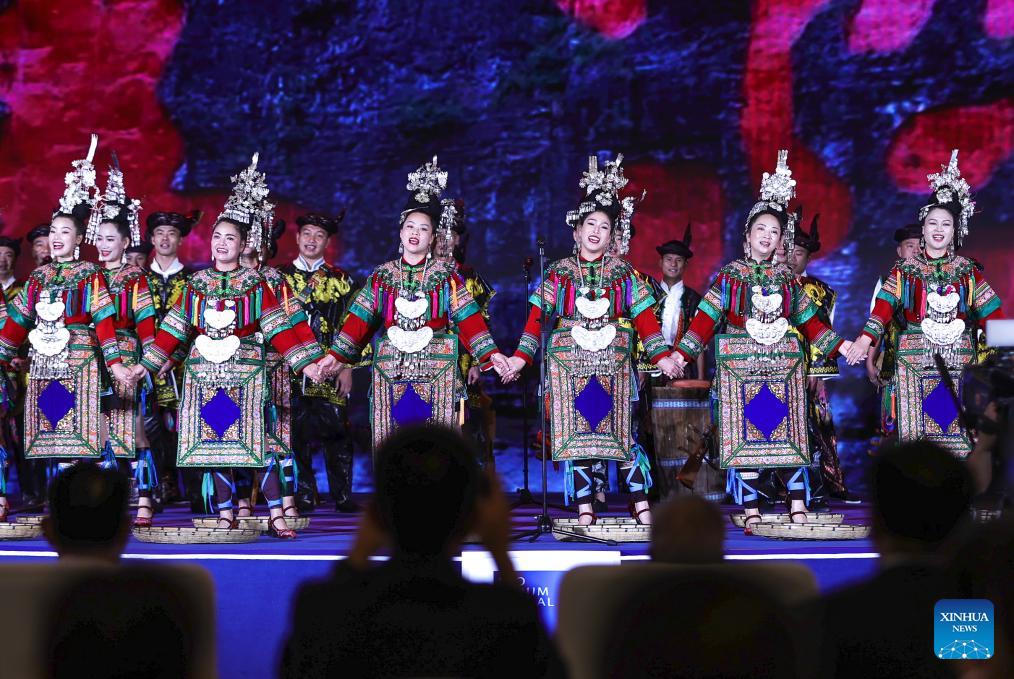Melodious folk singing reverberates in remote village
 0 Comment(s)
0 Comment(s) Print
Print E-mail Xinhua, August 2, 2023
E-mail Xinhua, August 2, 2023

Artists sing songs of Dong ethnic group at the closing ceremony of the Eco Forum Global Guiyang 2023 in Guiyang, southwest China's Guizhou Province, July 9, 2023. (Xinhua/Yang Wenbin)
In the early morning, Xiaohuang Village in southwest China's Guizhou Province reverberated with the enchanting singing of Pan Chayinhua.
Pan was performing the grand song of the Dong ethnic group, which boasts a rich history as a unique form of a folk chorus, characterized by its lack of conductor, accompaniment, and reliance on natural harmonies.
When the grand song was performed during an edition of the Paris Autumn Festival in the 1980s, it immediately captivated the audience with its ethereal melodies.
In recognition of its cultural significance, the United Nations inscribed the grand song into the list of the Intangible Cultural Heritage of Humanity in 2009.
Pan, 80, is a national inheritor of the grand song and boasts an impressive repertoire of around 300 songs.
In Pan's village, singing is woven into the fabric of daily life. "Whether we are happy or sad, busy or free, we find solace in song," Pan said with a sense of pride.
The village, with over 3,600 residents, has more than 60 singing groups divided by age and gender. Among these groups, Pan leads the senior choir, consisting of 12 dedicated members.
The drum tower serves as a communal gathering spot, where villagers come together to chat and sing during leisure hours.
Every Spring Festival, Xiaohuang Village transforms into a lively spectacle as people don their traditional costumes and the atmosphere becomes alive with the enchanting melodies of numerous singing groups.
In recent years, with the development of rural tourism and better infrastructure, an increasing number of tourists have visited the village to relish the enchanting performances of the grand song. This has also brought local singers diverse opportunities to increase their income.
Wu Dingfeng is the founder of a local cooperative dedicated to the grand song. He established the cooperative in 2014 after realizing the imminent risk of losing the traditional art due to the aging of the elder singers.
The cooperative provided a platform for the villagers to perform, learn from others, and exchange ideas. This has not only helped in the preservation of the unique culture but also allowed everyone to showcase their talents.
"Every year, we perform over 200 shows in collaboration with travel agencies, generating a total income of 200,000 yuan (about 27,982 U.S. dollars)," Wu said.
Wu also organized singers to perform in the United States, Japan and the Republic of Korea, taking the grand song to international audiences.
Since 2019, in an effort to preserve this cultural treasure, Wu has been providing funding for the recording of 28 elderly singers performing over 500 traditional songs, resulting in a remarkable collection with a total duration exceeding 20 hours.
"When a singer passes away, the songs only he or she had mastered will perish as well," said Wu. "This initiative seeks to immortalize the unique voices of the elderly singers, ensuring that their precious songs remain accessible for generations to come."






Go to Forum >>0 Comment(s)